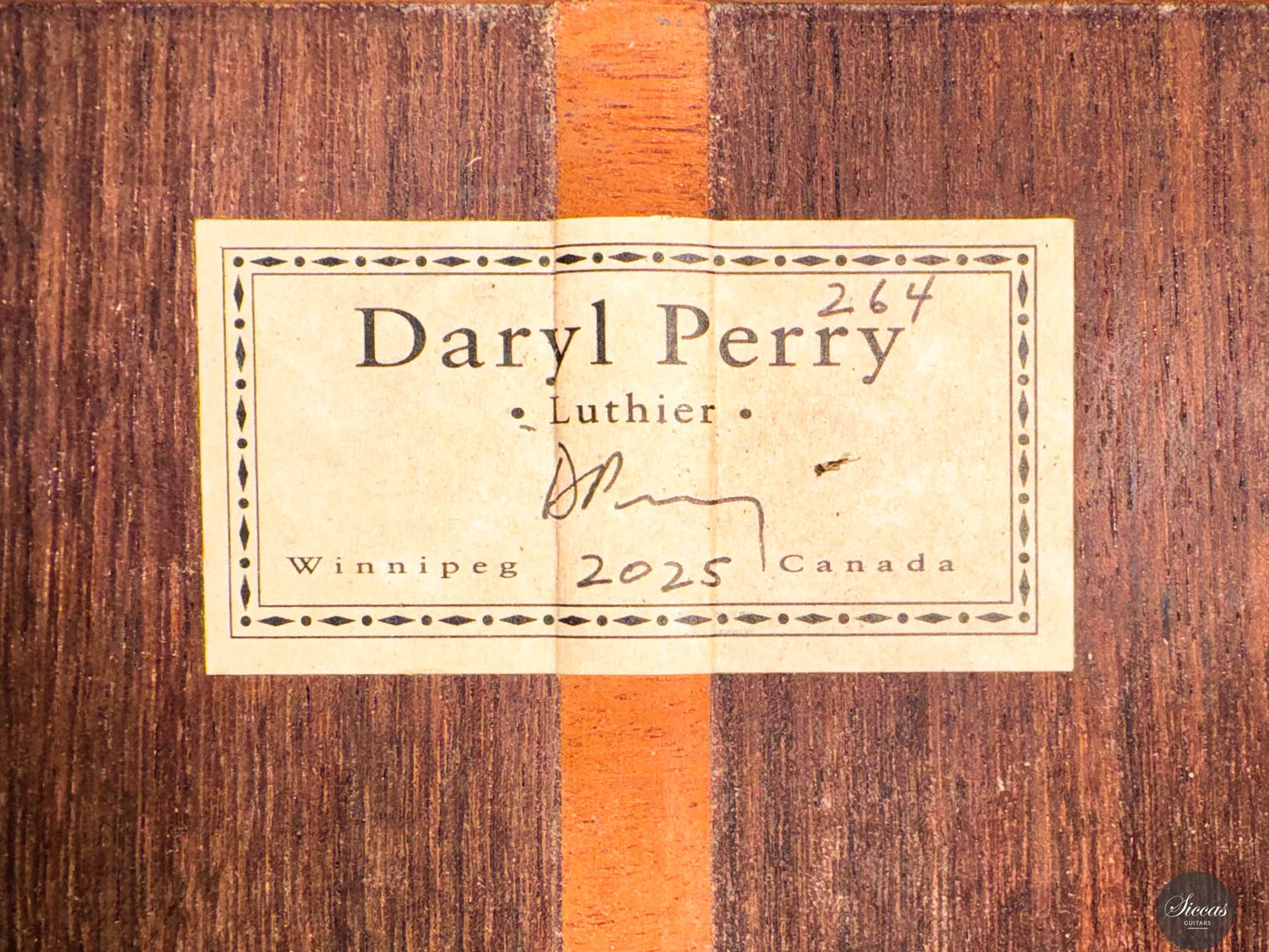Daryl Perry - 2025 No. 264
Daryl Perry - 2025 No. 264
Details
Details
Overview
Overview
Shipping important note
Shipping important note
Delivery times are typically reliable and most instruments arrive within the estimated timeframe.
Should any unexpected delay occur, our team will keep you informed and provide support at every step. For all shipping details and exceptions, please see our Shipping Policy.
Details about GPSR
Details about GPSR
























Video overview


More details about the guitar
About the luthier
This masterful concert guitar was crafted by Daryl Perry, one of Canada’s most respected luthiers, working from his Winnipeg-based workshop since the early 1980s. Deeply influenced by the great guitar makers of the 19th and 20th centuries, Perry’s approach is defined by the use of traditional hand tools and a profound sensitivity to the character of each wood he selects. His instruments have earned the trust of world-renowned players such as Marcin Dylla, and are known for their exceptional tonal purity, structural integrity, and elegant understatement. Each guitar is a refined synthesis of tradition, precision, and deeply musical intuition.
About the guitar
The 2025 No. 264 is a new, traditionally built concert guitar that fully embodies Perry’s vision of what a great classical instrument should be. Its spruce top, finished in French polish, is paired with Indian rosewood back and sides, creating a warm, singing voice with remarkable balance and color separation. Visually, the guitar is understated yet sophisticated, echoing the quiet elegance of historic instruments while remaining highly expressive in its own right.
Tonally, it offers a captivating blend of clarity and subtle richness. Each register is carefully shaped: the basses are present but never overwhelming, offering a supportive cushion of sound, while the trebles project with crystalline articulation. What sets this guitar apart is its tonal separation and spatial clarity. Each note occupies its own space, allowing complex polyphonic textures to unfold with ease. The sustain is generous, yet it never blurs articulation — making the guitar feel simultaneously powerful and controlled. With an air body resonance between F-sharp and G, it offers a grounded, stable platform for a wide dynamic range and interpretive nuance.
The guitar features a 650 mm scale and a 51 mm nut, with a lightweight body of just 1,440 grams, contributing to an overall sensation of responsiveness and intimacy. It invites expressive playing without resistance, rewarding even the most nuanced phrasing with a full, open voice. Fitted with Alessi tuning machines and finished entirely in French polish, this is an instrument of rare refinement, crafted to serve both the performer and the music with distinction.
Regular care extends the life of the instrument
Even with careful use, a classical guitar may gradually change in appearance or respond to unstable storage conditions. Have a close look at your guitar regularly and be attentif to changes. If your instrument is suffering from its environement, it will let you know.
Protect Your Guitar: Handle with Care
Be mindful when touching your instrument with greasy or unwashed hands: any skin contact is a small attack on the varnish. Of course, a guitar is made to be played, but taking a few precautions helps preserve its beauty: wash your hands before playing, wear long sleeves, and avoid unnecessary direct skin contact with the body of the instrument.
Pro tip: Avoid playing with a button-up shirt, heavy jewelry, or a belt, as these can scratch the guitar. Also, make sure your guitar case is free of any objects that could damage the instrument during storage.
String care
A good habit to adopt is wiping down your strings briefly after each playing session. This small action significantly extends their lifespan and helps maintain a consistent, comfortable feel under your fingers.
Most importantly, clean strings are essential for keeping your instrument in tune. Corrosion, sweat, and dust can affect the uniformity of the strings and interfere with accurate tuning across the entire fingerboard.
Pro tip: If you're having trouble getting your guitar in tune, it might be time to change the strings. A useful test is to compare the pitch of the 12th fret harmonic with the fretted note at the 12th fret; if there's an unusually large gap between them, your strings may have lost their integrity and should be replaced.
Keep Your Shellac Finish Shining!
Got a guitar with a shellac (French polish) finish? Here's a simple trick: Take a clean microfiber cloth and gently breathe on the surface to create a light mist. Then, softly rub to remove fingerprints, sweat, and grease. That’s usually all it takes to keep it looking great, no products needed!
Pro tip: Every few years, treat your guitar to a check-up with a luthier to keep it in top shape.
Storing Your Guitar: Climate Matters
Your guitar can safely stay outside its case, as long as the surrounding environment maintains 42–55% humidity and a temperature between 18–25°C.
Keep in mind that humidity levels can still fluctuate inside the case, especially during seasonal changes.
- Too much humidity may cause overtightened strings and a dull tone.
- Too little humidity can lead to a bulging top, string buzz, or even cracks.
Avoid placing your guitar near radiators, air conditioners, or windows with direct sunlight.
Pro tip: Always close your guitar case while playing. This helps preserve a stable microclimate inside the case, so your instrument is protected the moment you put it back in.



















































